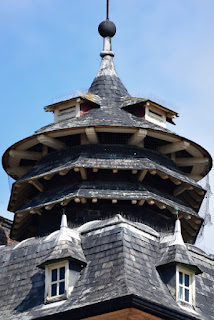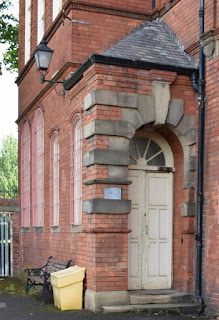The area of Ballast Hills is named after the mounds of ballast that was deposited in that area, one of many such Ballast Hills throughout the lower Tyne Valley. Ballast, which could take the form of any large and freely available material, i.e. clay, rocks etc. was used to "balance" the empty ships which used to come into the Tyne to take on cargo's. The ballast was simply unloaded and replaced by the cargoes which had the effect of balancing the ship once again.
The burial ground, known locally as Plaguey Fields or Grannies Park, was the most important con-conformist graveyard in Newcastle in the early and mid-seventeenth century, when many Protestant, Quaker, Baptist and Methodist immigrants buried their dead here. Use of the ground was heavy throughout the plague years and only fell out of use when the 1853-54 cholera epidemic closed all graveyards. In 1930 the ground was laid out as a play area and the remaining tombstones, around 200, laid down as flagging for paths, with the exception of those former non-conformist ministers, which can be found upright in one corner of the site.
The Grade II* Listed former Ouseburn School, in Albion Row, Byker, opened in October 1893 and closed in 1960's, reopening as a Business Development/Enterprise centre in 1993.
Some facts courtesy of Skyscraper City
1. Opened 1893 to accommodate 928 scholars:
Ground floor: 352 infants
First floor: 576 older children
Top floor: technical area (cookery, workshops, laundry, art)
2. A feature of the school was the opportunity to teach technical subjects and move away from too much book learning.
(a) “need for well cooked food”
(b) “the only true happiness is if the child can do everything for himself.
3. Architect was Frank Rich who for a while lived in Jesmond Gardens.
(a) planned around a central hall
(b) had 2 play yards: open and covered/ girls and infants and boys
(c) radiators admitted fresh warm air via piping from steam boilers.
(d) ventilator tubes led from every room to “up cast shafts” in the towers
(e) all class rooms had fireplaces – cookery room had an inbuilt oven range.
(f) sanitary arrangements: “simple and efficient”
(g) roofs (ogee and hipped) would not look out of place on an Eastern temple.
(h) cost: site, buildings, fees, fittings = £17,035
(i) other F. W. Rich buildings: Bolbec Hall/Turnbull's warehouse/St Gabriel's Church.
In January 2025 a team of researchers from Newcastle University announced that they are developing an online register of those who are memorialised or buried there. They are urging those with old photographs or records of the site to contact them here Newcastle University: Ballast Hills
14th April 2024




11th September 2023


Gravestone Paths.
21st August 2023

Horse Chestnut Trees.
You are never too old to collect conkers but you may be too early in the year.
24th June 2023



18th April 2023







3rd June 2022

2nd January 2022



5th September 2021

The old caretakers house for the school.
2nd July 2021



4th April 2021









10th February 2021

26th January 2021






15th December 2020

26thMarch 2020

1st October 2018
17th July 2018
21st February 2017
21st October 2012
16th January 2012
6th January 2012
29th October 2009
21st June 2009
8th May 2009
r.jpg)

Non-Conformist Ministers Gravestones.
r.jpg)
r.jpg)
r.jpg)
r.jpg)
r.jpg)
r.jpg)
r.jpg)
Gravestone Paths.
14th July 2008
18th May 2008
r.jpg)
r.jpg)
r.jpg)
r.jpg)
Gravestone Paths.
r.jpg)
30th April 2008
30th November 2007
r.jpg)
Nearby Shepherds Scrap Metals.
1st January 2007
18th May 2006
More Information:
- Historic England: Ouseburn Schools
- Historic England: Caretakers House at Ouseburn Schools
- Sitelines: Ouseburn Schools
- Sitelines: Ouseburn Schools, caretaker's house
- Sitelines: Ballast Hill
- Sitelines: Ballast Hills Graveyard
- Ouseburn Trust: Ballast Hills Burial Ground: A Forgotten Place in Newcastle
- BBC: Appeal for relatives to unlock graveyard's secrets
- Sky Scraper City: Ouseburn Schools
- Last Dying Words: Ballast, Burials and Ouseburn Body Snatchers
- Bard of Tyneside: Ballast Hills Burial Ground
See my other photos around Ouseburn:
- Ouseburn (2005 to 2012)
- Ouseburn (2014 to 2018)
- Ouseburn (2020 to 2023)
- Ouseburn (2024 onwards)
- Ouseburn Barrage
- Ouseburn Farm
- Ouseburn Street Art & Graffiti
- Ouseburn, Ford Street, Scrapyard Fire (2011)
- Ouseburn, Hume Street, Ouseburn Quays (Construction)
- Ouseburn, Ouse Street, Lower Steenberg’s Yard (Construction)
- Ouseburn, Ouse Street, Lower Steenberg’s Yard, Toffee Factory
- Ouseburn, The Malings (Construction)
- Ouseburn, The Victoria Tunnel


















r.jpg)



We always played here as kids and was known as Granny's Park. the best thing in the park was the old rope swing from a tree, if you were hot you could 'borrow' a bottle of pop of the waggons and take the empties back to the shop!
ReplyDeleteCheeky chappies! :)
ReplyDeleteI also used to play down there when I was a kid too. I loved that rope swing but the best swing was the one under the railway bridge above the Ouseburn. Proper scary :)
The description lists Protestants along with Methodists and Baptists. I assume by this the author means Anglicans who actually aren't Protestants, they're Anglican Catholics.
ReplyDeleteNo, it'll mean non-conformist Protestants, who weren't Anglicans and either couldn't, or wouldn't, be buried in Anglican cemeteries.
DeleteMy school was in the grounds there was a skull and crossbones stone built into the wall maybe from the time of the plague victims. I did my entrance exam drawings for art college in the park and in summertime we were allowed to spend playtime in there.
ReplyDelete